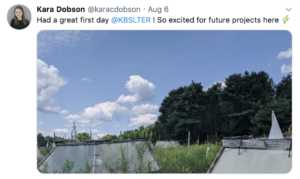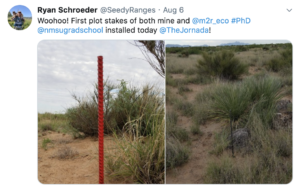
August 2020
LTER Network News is a forum for sharing news and activities from across the LTER Network. This is our water cooler. If you have personnel changes, new grants, or cross-Network activities that might interest your LTER colleagues, please send them along to weiss@nceas.ucsb.edu.
Announcements
2020 Request for Proposals: LTER Synthesis Working Groups. The LTER Network Office has announced a new request for synthesis working group proposals. The groups support scientific collaboration across and beyond LTER sites using LTER and other datasets. In the 2020 competition, the LNO expects to award 2-4 synthesis working groups at a funding level of up to $55,000 per year for up to two years. Proposals are due October 14, 2020, 5:00 p.m. PDT.
Diversity, Equity, & Inclusion Resource of the Month
As the reinvigorated Diversity, Equity and Inclusion Committee expands network-wide activities, we’ll be highlighting a new diversity resource in this space each month. Learn more at the DEI resources page.
Safe Fieldwork Strategies for At-Risk Individuals – Certain individuals are at higher risk for conflict and violence when they are in the field due to prejudice against their race/ethnicity, sexual orientation, disability, gender identity, and/or religion. This paper provides strategies for acknowledging and reducing the risk of conflict, promoting a diverse and inclusive environment, and maintaining the safety of researchers in the field.
LTER Graduate Student Spotlight
This month we feature a Q&A with Brian Kim, Chair of the LTER graduate student committee and a PhD student at the Virginia Institute of Marine Science. He researches benthic biogeochemistry at the Beaufort Lagoon LTER in Alaska, and has helped organize a number of community-building and professional development events for LTER grad students.
Around the Network
Congratulations to David Tilman of Cedar Creek Ecosystem LTER who was awarded the prestigious 2020 Blue Planet Prize for his work on the “diet-environment-health trilemma” and his advocacy for changes in agriculture and consumption.
Congratulations to Emeritus McMurdo Dry Valleys LTER PI Berry Lyons, who was awarded the 2020 SCAR Medal for Excellence in Antarctic Research by the Scientific Committee on Antarctic Research (SCAR)
Florida Coastal Everglades LTER supported efforts to help create the first map showing global mangrove habitats between 2000 and 2016 – a valuable tool to aid conservation efforts for these vital coastline defenders. Liza Goldberg, a NASA Goddard intern and freshman at Stanford University, was one of the map developers and created a website to explore the data.
The Baltimore Ecosystem Study LTER’s Integrating Chemistry and Earth Science (ICE) was featured in the CADRE Spotlight on Analyzing & Interpreting Data. The ICE Project created 3-D Earth science infused chemistry units and subsequent assessments that bring together lab and field investigations and exploration of local data sets to support teaching and learning about compelling phenomena in the Baltimore environment.
Scott Simon of Santa Barbara Coastal LTER ran a 3-day, remote, teacher professional development workshop this summer with approximately 25 local teachers, who also received a copy of The Golden Forest, the SBC LTER children’s book. The LTER education team also runs a VirtualREEF YouTube Channel which contains videos about both the SBC and Moorea Coral Reef LTERs and related topics.
Cedar Creek LTER has been hosting monthly Lunch with a Scientist live broadcasts to offer remote education opportunities on topics including bison, fungi, and bees. They also host a Cedar Creek Ecology book club that gathers on zoom, and a video series on FlipGrid.
Several Hubbard Brook LTER researchers held a Virtual Climate Change Roundtable with New Hampshire Representative Annie Kuster to discuss the latest research and findings on climate change in the region.
Save the Dates
National Diversity in STEM Conference, October 22-24 2020, hosted by the Society for Advancement of Chicanos/Hispanics and Native Americans in Science (SACNAS).
The Fall Meeting of the American Geophysical Union is scheduled for December 7-11 2020, as a mainly virtual meeting with the theme “Shaping the Future of Science.”
Recent Press
From the National Science Foundation
Other media
- Lynx take epic, 2,000-mile treks—but why is a mystery | National Geographic
- All-Female Science Party aboard R/V Sally Ride Continues 71-year CalCOFI Measurement Series | Scripps News
- A Collaborative Approach: Marine scientists will lead new research network focused on coastal California | The Current
- No signs of large-scale insect apocalypse in North America yet, study says | Washington Post
- The pandemic stilled human activity. What did this ‘anthropause’ mean for wildlife? | Science Magazine
- Making your own ice storm: Latest in climate science research | Bulletin of the Atomic Scientists
- MSU study finds no-till farming yields long-term economic benefits | Great Lakes Echo
- How Decades of Racist Housing Policy Left Neighborhoods Sweltering | New York Times
Papers of Interest
The most recent LTER-related papers are available on the LTER Network web site and the full Network bibliography is available at the LTER Network Zotero Group Library. Listed here is just a small sampling of the 30-40 LTER related papers that are published each month.
- What can we learn from wildlife sightings during the COVID‐19 global shutdown? | Ecosphere
- Carbon budget of the Harvard Forest Long‐Term Ecological Research site: pattern, process, and response to global change | Ecological Monographs
- Global declines in human-driven mangrove loss | Global Change Biology
- No net insect abundance and diversity declines across US Long Term Ecological Research sites | Nature Ecology & Evolution
- Evaluating the effects of regional climate trends along the West Antarctic Peninsula shelf based on the seabed distribution of naturally occurring radioisotopic tracers | Marine Geology
- Patient propagules: Do soil archives preserve the legacy of fungal and prokaryotic communities? | PLOS One
- Root herbivory controls the effects of water availability on the partitioning between above and belowground grass biomass | Functional Ecology
- The ecological and evolutionary consequences of systemic racism in urban environments | Science
Funding Opportunities
- NSF Coastlines and People Hubs for Research and Broadening Participation (CoPe) | Letter of Intent due September 28, 2020
- NSF Inclusion across the Nation of Communities of Learners of Underrepresented Discoverers in Engineering and Science (INCLUDES) | Letter of intent due October 9, 2020
- NSF Graduate Research Fellowship Program (GRFP) | Full proposal due October 19, 2020
Jobs and Fellowships
- Postdoctoral Research Scholar in Earth System Science for the Anthropocene | Arizona State University
- Ph.D. position in seagrass biodiversity | University of Virginia
- Ph.D. position in ecological synchrony of kelp forests | University of Virginia
- Doctoral position in tropical ant ecology | Luquillo LTER via University of Southern Mississippi
- 2020 Summer and Fall Jobs: Plant Community Ecology Internship | Cedar Creek Ecosystem Reserve
Committees and Interest Groups
Feeling a little isolated under COVID19? It is only by drawing on the energy and expertise of LTER participants that the Network can be relevant to your needs. Visit the LTER committees page to learn what’s happening and how to get involved.
Twitter Pics of the Month












